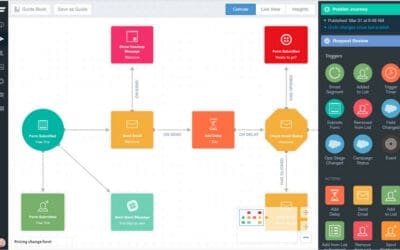Starting a business blog can be a transformative step for local business owners looking to enhance their online presence and engage with their audience. A blog not only allows you to share your expertise and insights but also serves as a platform for attracting potential customers. In this guide, we will explore the essential steps to start a business blog and delve into various blog types that are particularly easy to monetize.
Why Start a Business Blog?
A business blog can significantly benefit your marketing efforts by providing a space for sharing valuable content. Here are some compelling reasons to start a blog:
- Improve SEO: Regularly updated content can enhance your website’s search engine optimization (SEO), helping you rank higher in search results.
- Establish Authority: Sharing your knowledge and insights helps establish you as an authority in your field, building trust with your audience.
- Engage with Customers: Blogging allows you to interact with your audience, encouraging comments and feedback that can foster a community around your brand.
- Generate Leads: A blog can serve as a funnel to attract potential customers, guiding them to your products or services.
- Social Media + Email Marketing: Sharing your blog posts via social and email marketing is the best way to distribute your content to reach current clients and build your company’s brand awareness.
1. Decide What Type of Blog to Start
The first step in launching your business blog is determining the type of content you want to create, brand voice, as well as how to position your brand and business. Think about your target audience (customers/clients/guests) and the interests that align with your expertise.
Below are some popular business blog types:
Restaurant Blogs
If your team has a passion for baking, cooking and love experimenting with new recipes, starting a food blog can be a rewarding venture. You can share recipes, cooking tips, and kitchen hacks, and even collaborate with food brands for sponsorships. This also allows you to showcase your staff- both the front and back of the house, while promoting your limited time offers, featured specials, pictures of your meals and featured guest quotes. Plus your blog posts are great for your social media profiles and including posts within your email newsletters.
Gyms, Fitness and Wellness Blogs
If health and fitness are your passions, consider starting a wellness blog. You can share workout routines, nutritional advice, and wellness tips, and potentially partner with fitness brands for affiliate marketing.
Business Blogs
A business-focused blog can target entrepreneurs, startups, and specific industries. Share insights on topics like marketing strategies, financial advice, or leadership tips. This type of blog can showcase your work, team, client quotes or interviews, and is perfect for showing before and after pictures of anything your team builds, fixes or maintains.
Most local businesses can benefit from a blog, especially- business services (accountants and lawyers), landscapers, all local retailers, tree services, construction, pest control, financial advisors, florists and the list goes on.
Travel Blogs
If you love exploring new places, a travel blog can be an incredible outlet. Share your travel experiences, tips for budget travel, and destination guides, and partner with travel companies for sponsored content.
Lifestyle Blogs
Lifestyle blogs cover a wide range of personal interests and experiences. Discuss topics such as home decor, personal development, or parenting. These blogs can attract a broad audience and open doors for brand partnerships.
Craft Blogs
Crafting has become increasingly popular, and a craft blog can serve as a platform to share DIY tutorials, crafting tips, and project ideas. You can monetize through affiliate links or by selling your own craft products.
Finance Blogs
Finance blogs can cover personal finance topics, investment advice, budgeting tips, and more. This type of blog can attract readers looking for financial literacy, and you can monetize through affiliate marketing or sponsored content. All financial advisors should have their own blog.
Sports and Athlete Blogs
If you are a sports enthusiast, or athlete, consider starting a blog focusing on your favorite teams, sports news or you and your team’s season achievements. This niche can attract a dedicated following, opening opportunities for advertising and sponsorships.
Parenting Blogs
Mommy blogs address topics related to parenting, family life, and personal challenges. This niche can attract a loyal audience and create opportunities for collaborations with brands targeting parents.
Entertainment Blogs
Blogging about movies, music, and celebrity news can attract a broad audience. You can monetize through affiliate marketing, sponsored posts, and advertising.
Fashion and Beauty Blogs
Fashion and beauty blogs can focus on trends, product reviews, and style tips. This niche has significant monetization potential through affiliate sales and sponsored content.
Hobby Blogs
Finally, consider blogging about your hobbies, whether it’s gardening, gaming, Traxxas remote control cars/trucks/boats, or model trains. Niche blogs can attract dedicated followers and offer unique monetization opportunities.
2. Choose a Blogging Platform
Once you’ve decided on a blog type, the next step is selecting a blogging platform. Two main options are:
- Self-Hosted Platforms: These platforms, such as WordPress.org, give you complete control over your blog’s design and monetization. You’ll need to purchase a domain name and hosting, but this option offers the best potential for growth and customization. Your main website would considered ‘Pages’ and with ‘Blog Posts‘.
- Third-Party Platforms: Platforms like Medium or Blogger allow you to start blogging for free. However, they come with limitations on customization, search engine optimization strategies and monetization capabilities.
3. Get a Domain Name
Choosing a domain name is a crucial step in establishing your blog’s identity. Aim for a name that reflects your blog’s content and is easy to remember. Many hosting providers offer free domain registration for the first year when you purchase hosting services.
If you’re already an established business try to see if you can register a website domain that includes your business name. When you already have a website that’s lacking a blog, a new website can be built that includes one.
4. Design Your Blog
The design of your blog should reflect your brand and make it user-friendly. Use templates provided by your blogging platform or hire a designer to create a custom layout. Ensure your blog is mobile-friendly, as many users access content on their smartphones.
5. Create Quality Content
Content is king in the blogging world. Focus on creating high-quality, engaging posts that provide value to your readers. Incorporate a mix of formats, such as how-to guides, listicles, interviews, personal stories and videos. Consistency is key, so establish a posting schedule that you can maintain.
6. Promote Your Blog
To attract readers, actively promote your blog through social media, guest blogging, and email marketing. Engage with your audience by responding to comments and sharing your posts on various platforms. Collaborate with other bloggers in your niche to expand your reach.
7. Monetize Your Blog
Finally, explore different monetization strategies once your blog gains traction. Consider affiliate marketing, sponsored posts, selling digital products, or offering online courses. Choose the methods that align best with your blog’s content and audience.
Bottom Line
Starting a business blog can be a rewarding journey that enhances your brand visibility and opens new revenue streams. By choosing the right blog type and following the necessary steps, you can create a platform that engages your audience and generates income. Embrace the process and let your passion shine through your blog!







